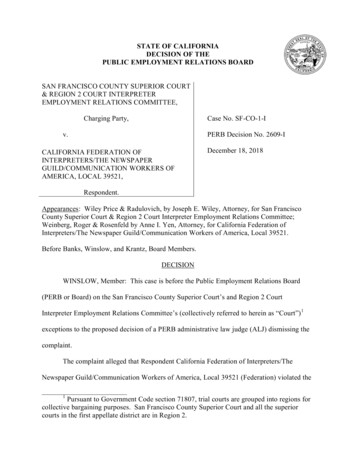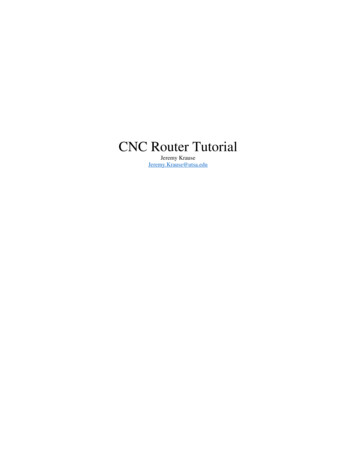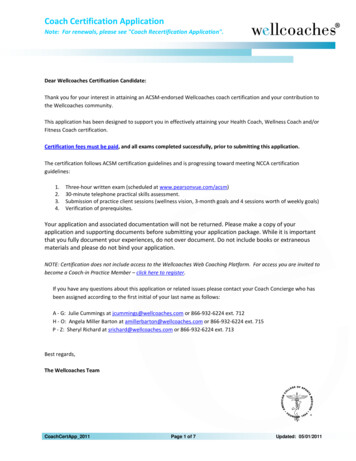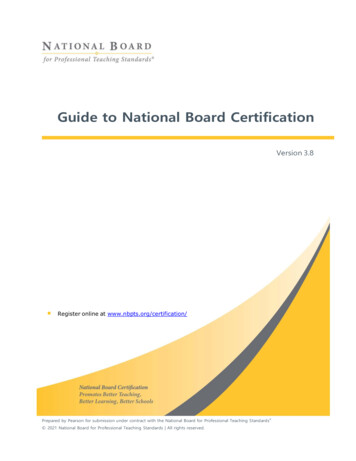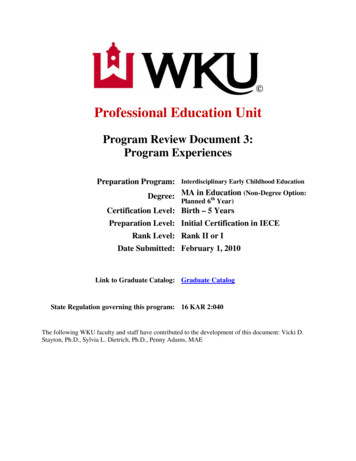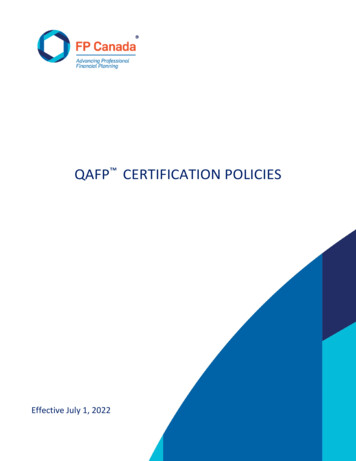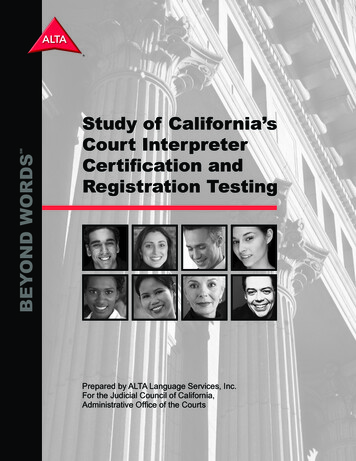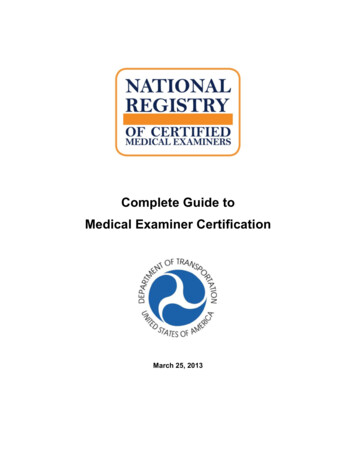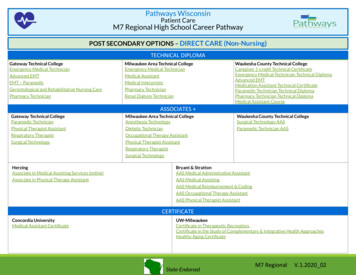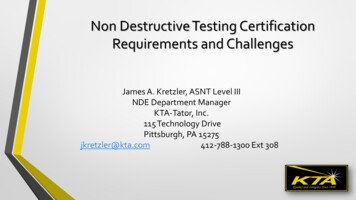
Transcription
4/2/2018Certification Commission for Healthcare InterpretersNational Medical Interpreter Certification:What's Next for Interpretersof Languages of Lesser DiffusionMargarita Bekker, Core‐CHI , CCHI ChairNatalya Mytareva, Core‐CHI , CCHI Executive Director 2018, CCHIOverview1. CoreCHI Certification and LLD2. Limitations of language proficiencytesting of LLD interpreters3. Interpreter PerformanceCompetencies4. Testing Core Interpreting Skills inan English‐only Modality5. Challenges & What’s Next?www.cchicertification.org1
4/2/2018Inclusiveness and Fairness‐ foundational principles of CCHI CCHI certification programs are for interpreters of ALL languages Each certification is a continuously evolving programwww.cchicertification.orgCore Certification HealthcareInterpreter (CoreCHI )CoreCHI is THE one certification every interpreter of everylanguage needs to have and can have today.This certification tests medical interpreters of any language onthe core professional knowledge as well as critical thinking,ethical decision‐making, and cultural responsiveness skillsneeded to perform the interpreter’s duties in any healthcaresetting.www.cchicertification.org2
4/2/2018CoreCHI Certification CoreCHI certification is nationally accredited Defined and supported by the national Job TaskAnalysis study 765 CoreCHI interpreterswww.cchicertification.orgCoreCHI Certification100 Multiple Choice Questions in English covering:1.2.3.4.5.Professional Responsibility and Interpreter Ethics ‐ 22%Manage the Interpreting Encounter ‐ 22%Healthcare Terminology ‐ 22%U. S. Healthcare System ‐ 15%Cultural Responsiveness ‐ 19%www.cchicertification.org3
4/2/2018“Top” 10 CoreCHI LanguagesCoreCHI Certificants26 ASL10271 6967 5754 4540 34 31www.cchicertification.org“Bottom” 10 CoreCHI Languages111CoreCHI Certificants1 1 11111www.cchicertification.org4
4/2/2018What does LLD Mean? Languages of Limited Diffusion – languages of relatively small populationof patients with LEP residing across the U.S. and which have noeducational opportunities for studying these languages available in theU.S.E.g., Burmese, Hmong, Kirundi, Mayan languages, Nepali, Somali. For example,there are over 30,000 Somalis residing in Minneapolis, MN, and Columbus, OH,each, yet very few outside these two cities, and there are no college‐levelprograms teaching the Somali language in the U.S. Languages of Lesser Demand – languages of relatively small population ofpatients with LEP residing in a specific geographic area in the U.S., yetwhich have reasonably accessible educational opportunities for studyingthese languages available in the U.S.E.g., French, German, Japanese. For example, the demand for interpreters ofJapanese may be non‐existent in Akron, OH, yet significant in Los Angeles, CA,and at the same time there are quite a few college‐level programs teachingJapanese in the U.S.www.cchicertification.orgChallenges LLD interpreting presentsfor testing Defining the pool size of potential certificants: How many certified interpreters in a specific LLD are able to earn theirlivelihood as a healthcare interpreters? How many certified interpreters inthat LLD does the industry need? Absence of educational opportunities in the U.S. for studying andmastering a specific LLD to the level appropriate for interpreting Lack of written resources in some LLDs and of valid writtenresources in some LLDs about health, medicine, and provision ofhealth care Insufficient online presence of some LLD communitieswww.cchicertification.org5
4/2/2018Why Change?www.cchicertification.orgBecause We Heard You!Written examabout healthcareinterpreting isnot enoughLanguageproficiency testis not enoughwww.cchicertification.org6
4/2/2018Limitations of language proficiencytesting of LLD interpreters Ok, they can speak Kinyarwanda but can they interpret? Who are the raters? How are their abilities assessed? Could theysee themselves as “gate keepers”? How often & how many tests doraters rate? How objective can scoring be is there is only 1 rater per candidate?How is raters’ performance monitored? If there are only 3 raters ofan LLD, how relevant their interrater reliability indicator is? How do we know that X level on X test really is enough for thecandidate to be able to interpret if there have been no studiescomparing the two? How are these test developed (how many SMEs, updatefrequency)? How do they perform psychometrically?www.cchicertification.orgChange does not happen overnight Environmental ScanVariety of StakeholdersPurpose of the changeProsConswww.cchicertification.org7
4/2/2018Environmental Scanwww.cchicertification.orgVariety of Stakeholders involved in focusgroups Healthcare InterpretersInterpreter Trainers & EducatorsInterpreter ManagersLSC (language service companies) representativesLinguistsCourt InterpretersConference interpreterswww.cchicertification.org8
4/2/201840 experts participated in totalIncluding theseLSCs:CLI, Martti,TransperfectPurposeThe need to create a valid and reliable performance examination, assessing core interpreter’s cognitive skills/subskillsresponsible for a successful conversion of meaning from onelanguage into another, for interpreters of languages for which developing a bilingualperformance exam at the CHI level is unfeasible.www.cchicertification.org9
4/2/2018Format1. Stakeholders were invited to participate in small‐size focusgroups over the phone2. Additionally 6 individual interviews were held3. Each groups had 1‐2 CCHI facilitators4. CCHI’s main goal was to listen and collect .4.Is it needed?Is it possible?What are the core skills we would be able to test?What are the limitations and challenges?www.cchicertification.org10
4/2/2018Pros1. Test performance (and not just knowledge) for languagegroups that would never have a bilingual oral exam.2. Assess the inherent interpreting skills (and not just proficiency)common to all languages.3. English language proficiency and fluency is assessed.4. Relies in some precedents for such an exam (i.e. some dataexists).5. Increased opportunities for LLD interpreters.www.cchicertification.orgCons1. What are we testing? What are the limitations?2. Can we validate it? What will psychometricians think?3. Inability to assess the level of fluency in the non‐Englishlanguage4. Possible advantage to heritage speakers with English asdominant language5. Inability to assess the ability to perform in both languages inthe moment (since only component skills are tested)www.cchicertification.org11
4/2/2018What are we testing?www.cchicertification.orgInterpreter PerformanceCompetenciesCCHI’s 2016 JTA Study: Domain VI. Interpret in Healthcare Settings1. Interpret consecutively between source and target language to facilitatecommunication.Skill in (also need for the simultaneous and sight translation modes):a.Retaining and recalling information in short‐term memoryb.NotetakingIn Englishc.Listening actively and comprehending oral speechIn Englishd.Communicating fluently in working languagesIn Englishe.Maintaining accuracy and transparencyCheck knowledge of thef.Maintaining the registerconceptIn Englishg.Self‐monitoring for comprehension and outputh.Anticipatory listeningwww.cchicertification.org12
4/2/2018Interpreter PerformanceCompetenciesCCHI’s 2016 JTA Study: Domain VI. Interpret in Healthcare Settings2. Interpret simultaneously from the source language into the targetlanguage to facilitate communication.Skill in:a.Listening, processing, and interpreting simultaneouslyMay test ability toperform intra‐linguisticreformulationsimultaneously3. Sight translate a written message by rendering it into a spoken or asigned language to facilitate communication.May test ability toSkill in:perform intra‐linguisticreformulationa.Reading and comprehending written text in Englishb.Converting written text into the spoken or signed target languagec.Anticipatory readingwww.cchicertification.orgInterpreter PerformanceCompetenciesCCHI’s 2016 JTA Study: Domain VI. Interpret in Healthcare Settings4. Maintain fidelity to the message by taking into considerationregister, cultural context, and nonverbal content to convey theoriginal intent.a.Interpreting without additions, omissions, or substitutionsMay test ability toperform on.org13
4/2/2018Can we validate amonolingual E2E interpreterperformance exam?www.cchicertification.orgExisting Research on Interpreting Conference interpretingTeaching conference interpretingASL interpretersData from the State of WA interpreter screening examwww.cchicertification.org14
4/2/2018Franz Pöchhacker (2004)A number of authors have described teaching approaches forvarious preliminary and ancillary skills for interpreting in general.These relate in particular to analytical skills in text comprehension (e.g. Seleskovitch andLederer 1989, Kalina 1992, Setton 1994, Winston andMonikowski 2000), expressive skills for 'public speaking' (e.g. Weber 1990), situation analysis (e.g. Thiery 1990), and assignment preparation, with special regard to terminologyresearch and documentation (e.g. Schweda Nicholson 1989).Pöchhacker, Franz. 2004. Introducing Interpreting Studies. Routledge. P. 183www.cchicertification.orgDaniel Gile (2005)It is important to remember that interpreting relies on strategic andcognitive skills which can to a large extent be acquired in the courseof monolingual consecutive interpreting exercises In fact, most of the errors and omissions in conference interpretingcan probably be traced to cognitive failure, due to either highprocessing capacity requirements that the interpreter cannot meet, orerrors in processing capacity management Gile, Daniel. 2005. Teaching Conference Interpreting.In Tennent, Martha (Ed). Training for the New Millennium:Pedagogies for Translation and Interpreting.Amsterdam and Philadelphia: John Benjamins. P.144, 130www.cchicertification.org15
4/2/2018Steps in Validation1. Convene a representative National Task Force (group of experts) todesign the E2E exam structure and rating/scoring parameters2. Develop a pilot exam content following the same procedures as forthe CHI ‐Spanish exam, i.e. best national testing practices3. Conduct pilot testing with 200 number of candidates of Spanish,Arabic, and Mandarin.4. Conduct sets of psychometric analyses for concurrent validation: Compare of the E2E exam scores of Spa, Ara & Man candidates to theirscores on the bilingual CHI exams5. Prepare recommendations about validity of the monolingual E2Eexam and/or its componentswww.cchicertification.orgBenefits of the E2E Study for LSCsIf positive findings, i.e., concurrent validation: Reliable and valid, standardized, evidence‐based performanceassessment for interpreters of any language which will only need one supplement – testing or portfolio assessmentof language proficiency in the non‐English language Creating quick E2E pre‐employment, screening tests forpotential interpreters prior to investing in their education andhiringIf negative or inconclusive findings: Evidence‐based knowledge that only dual‐language interpretercertification exam can reliably assess interpreter performancewww.cchicertification.org16
4/2/2018Challenges Recruiting pilot takers who are willing totake the pilot exam (in addition to the CHIexams) Recruiting testing venues for an extendedCHI exam (1 hrs regular 30‐60 min of thepilot) Funding (for test construction andpsychometric analysis) If the pilot study results prove the concept– education about its value & limitations If the pilot study results are inconclusive ornegative, the only option – creation ofbilingual examswww.cchicertification.orgWhat is next?1. National Task Force to define the scope & structure of the exam(under the guidance of psychometricians)2. National recruitment of SMEs to develop the exam content3. Pilot study to prove the concept psychometrically (evidence‐basedapproach)– need HELP from EVERYONEto be Research Partners depending on the result: Funding Development of full exam17
4/2/2018Follow us on Social CCHIcertifyCertification Commission for Healthcare Interpreterswww.cchicertification.org18
CCHI certification programs are for interpreters of ALL languages Each certification is a continuously evolving program www.cchicertification.org Core Certification Healthcare Interpreter (CoreCHI ) CoreCHI is THE one certification every interpreter of every language needs to have and can havetoday.
